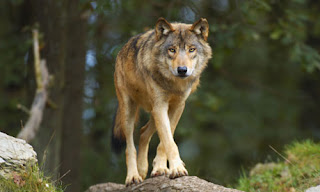 |
| The European gray wolf is steadily returning to much of its former range in western Europe. |
They have returned to France, and, according to shepherds, have moved into Albania from Greece. From Sweden they have sought new territories to bolster Norway's small population. Animals from eastern Europe have arrived in Germany. And Spanish and Italian packs are spreading. A Dutch businessman has bought land in Scotland and announced plans to re-introduce wolves to a country where none have been seen since for centuries. And they migrate: one day wolves instead of foxes could be rifling through the bins of Surrey or Kent.
These returns and the "right" of return are a contentious and emotional issue. For some it is an indication of a re-wilding of European landscapes that should be celebrated. Others express anger that a "ruthless killer" is being allowed to return to places that have long been safe from its predations.
In the popular imagination no other wild animal threatened humans in the ways that wolves did – illustrated by the monstrous werewolf, which would prey on man, woman and child. This lupophobia – not just a fear, but a deep hatred – goes back to the time when humans began to live with and depend on flocks of sheep, goats and, later, cattle. Instead of preying on wild animals, a proper thing for carnivores, wolves turned to animals that belonged to and were under the protection of humans. Jesus's characterisation of wicked people as being like ravening wolves threatening sheep would have been easily understood in a pastoral society. The wolf lived with this reputation of evil wildness for centuries.
Only from the mid-20th century did environmentalists challenge the idea that it was right and proper to kill and eradicate wolves. In the 1970s the wolf became listed as an endangered species in North America and some parts of Europe, protected from hunting and other forms of killing. In Europe this was fairly unproblematic – until numbers increased and they began to migrate in search of new territories.
Now there is a new war over wolves: fought between those who champion their return and livestock owners who believe their fragile livelihoods are threatened. This new war is significant in terms of the biopolitics of living with carnivores. Who is it who wants wolves in Europe and why? Who is it who seeks to halt their re-emergence? If it is important – environmentally or culturally significant – to have this powerful carnivore living freely in Europe, then it is essential to debate what living with wolves should or could be.
Scientists comment on wolves' role in local ecology; governments offer compensation for the loss of livestock; advocates promote the rights of wolves to exist; shepherds feel frustrated that they suffer the consequences of living with wolves that seem to be wanted by people from cities who are unlikely to even see them. These parties rarely come together to discuss their views.
The solution is not imposition but dialogue. Conservation projects, however soundly based on science, can never succeed without taking account of the human dimension. Wildlife has to co-exist with humans. Put crudely, scientists often seem frustrated that local people do not understand what they tell them about the realities of wolves; shepherds and other livestock farmers feel resentful that outsiders do not want to listen to their traditional knowledge; and agricultural agencies seem to think that compensation for animals killed is payment enough for wolf predation.
And such concerns cannot be reduced to Canis lupus: the simple, physical wolf. These are deep-rooted attitudes about the wolf in all its social, cultural, historical, political, economic and psychological entanglements with humans.
A French expert has suggested a parliament for wolves, bringing together all interested parties. Only debate will find a way through the rage of those who seek to cull wolves and the passions of those who believe they should be allowed to rediscover their place in European biocultures.
No comments:
Post a Comment